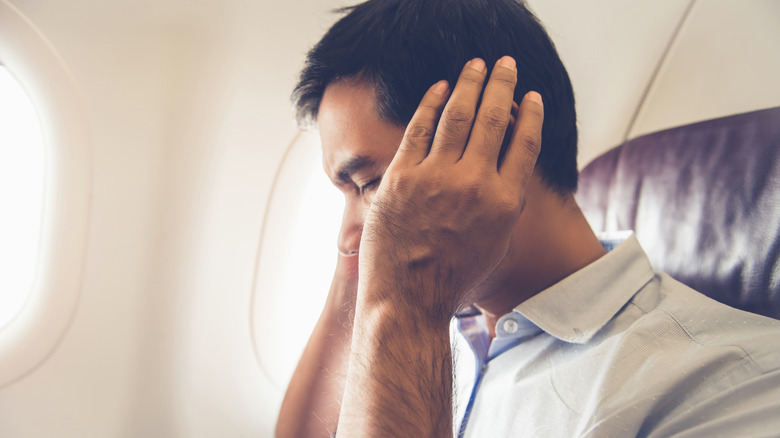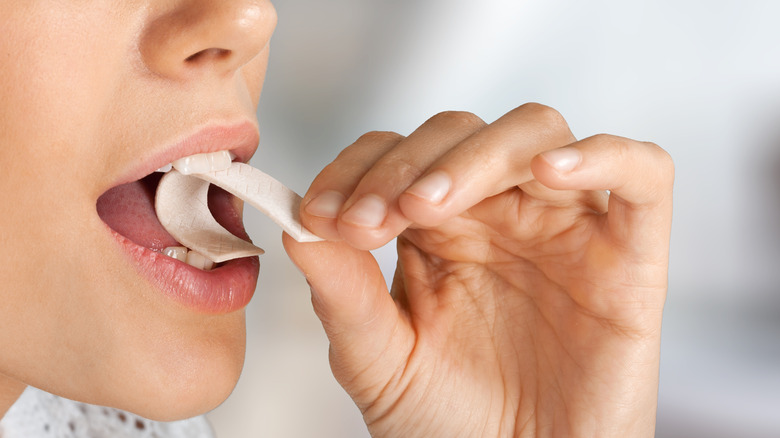Try TikTok's Latest Hack To Keep Your Ears From Popping On Your Next Flight
Technology hasn't advanced far enough to let us teleport to places we want to go, so for now, we have to make do with riding on airplanes. And while flying on planes is often a surreal experience, regardless of the flight length and the distance to your destination, it's not without its drawbacks. For one, airplanes are dirty. For another, airfare can be prohibitively pricey at times. Also, flying in those metal tubes can be uncomfortable, not only because you're unable to stretch your legs for hours at a time, but also because you get the pesky "airplane ear." And no, that doesn't refer to eavesdropping on your seatmates (don't do that).
"Airplane ear" is the uncomfortable and sometimes painful sensation you feel in your eardrum due to cabin pressure. Also referred to as ear barotrauma, it's "a condition that is caused by a difference in air pressure between the inner ear and the surrounding environment during air travel," Dr. John Whyte, chief medical officer at WebMD, explained to HuffPost. "It typically happens during takeoff or landing, causing discomfort and pain in the ears. The pressure changes can lead to the eardrum becoming stretched or, in rare cases, even ruptured. This causes pain, which can present as the ears feeling clogged or popping."
If you're lucky, your airplane ear will go away on its own. But if you find that you're more susceptible to feeling ear pain and popping during flights, there's a hack you can try to relieve the pressure, and it involves the use of plastic cups.
Use cups and hot paper towels to relieve pressure
Having airplane ear can understandably ruin your flying experience, so it's best to take measures to mitigate your discomfort. According to TikToker The Ear Nurse, who works as a specialist ear nurse and dubs herself an "earigator trainer" and ear wax removal expert, a lesser-known hack to alleviating pressure in the ears is using plastic cups and some hot paper towels. The key here is to ensure that the paper towels are soaked in hot water so it creates steam when placed in the cup.
In her video, The Ear Nurse explains: "Ask your flight attendant for two plastic cups with hot paper towels. Trust me, they will know exactly what you're asking for. Put these on both of your ears, causing an air-tight seal." She added that the steam helps stabilize and relieve the pressure in your ear mid-flight. "It's all to do with barometric pressure," she said. "When the plane rapidly climbs or descends, it changes the pressures so quickly that the Eustachian tube often can't keep up."
The best part about this hack? It can be used on both adults and children alike! The nurse even asserts that it works for general ear pain and not just airplane ear. Some users noted in the comments that this hack indeed works, with one writing: "This absolutely works; a flight attendant taught us this when my 6-year-old had an issue on a flight home many years ago!"
You can also use age-old tricks like sucking on lozenges and chewing gum
Now if you don't feel like holding two cups over your ears, you can always turn to tried-and-tested tricks like yawning, swallowing on purpose, sucking on lozenges, or chewing gum. Dr. Gary Snyder, a New York-based board-certified otolaryngologist, pointed out to Conde Nast Traveler that a specific type of gum is ideal. "Gum in general is a good idea, but mint gum causes extra saliva and extra swallowing, which can be better for the ears for plane flights," he said. As it turns out, the more you swallow, the more your Eustachian tubes will be inclined to open up.
If you usually have a bad case of airplane ear, though, Dr. Carl Philpott, professor of rhinology and olfactology at Norwich Medical School at the University of East Anglia, advised that you may be better off using a nasal decongestant spray or pill, as they help relieve congestion that may compromise the opening of your Eustachian tube. "If you anticipate it might get bad, it would be ideal to use a decongestant just before boarding, and if it's particularly bad, then on the airplane before descending, too," he told Time.
It's worth noting that these tips may not make the pain go away completely, but they can help a great deal in easing your discomfort.

